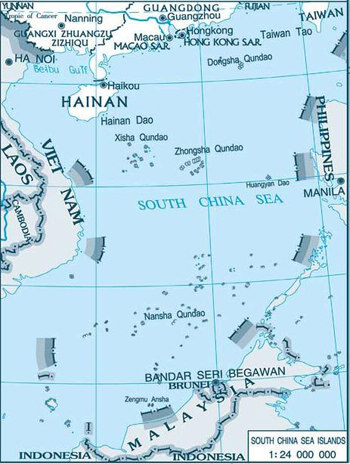|
 |
|
(Source: China's National Administration of Surveying, Mapping and Geoinformation) |
China and ASEAN countries have reached an agreement on a guideline for implementing the Declaration on the Conduct of Parties in the South China Sea (DOC), which lays a solid foundation for their practical cooperation and will be helpful for the settlement of disputes in the area, said Chinese officials and scholars.
The guideline is encouraging, as it consolidates the principles of "peaceful solution, consultation and joint development," said Tao Wenzhao, a senior research fellow with the Institute of American Studies at the Chinese Academy of Social Sciences.
The agreement was reached on July 20 during the series of ASEAN foreign ministers' meetings in Bali, Indonesia. The eight days of events from July 16- 23 included the 44th ASEAN Foreign Ministers' Meeting, the ASEAN-China Foreign Ministers' Meeting, the ASEAN Plus China, Japan and South Korea Foreign Ministers' Meeting, the East Asia Summit Foreign Ministers' Consultation and the 18th ASEAN Regional Forum Foreign Ministers' Meeting.
Calming territorial rows
The guideline, along with consensus on future cooperation in the South China Sea, has attracted attention because in recent months there has been a flare-up in territorial spats between China and neighboring Southeast Asian nations.
In April, the Philippines filed a note with the UN, claiming sovereignty over parts of China's Nansha Islands. Three months later, a group of Philippine lawmakers visited one of the disputed islands in the South China Sea. In addition, the United States have recently held joint military exercises with the Philippines and Viet Nam respectively in the area.
The Nansha Islands in the South China Sea have long been acknowledged as Chinese territory. Since the early 1970s after the region was found to be rich in oil and other natural resources, however, Southeast Asian countries including Viet Nam, the Philippines, Malaysia and Brunei have claimed sovereignty over all or part of the islands.
China and ASEAN signed the DOC in 2002, pledging to solve South China Sea dispute through peaceful means.
The newly adopted guideline pointed out the direction for the implementation of the DOC and defined the principles for future cooperation in the area, China's Ambassador to ASEAN Tong Xiaoling told Xinhua News Agency.
With the guideline in place, the countries will shift their focus to practical cooperation instead of empty talk, said Tong.
She said China and ASEAN countries could establish working groups and special committees to carry out less sensitive cooperative projects in the South China Sea, such as maritime safety, marine biology and seismic explorations.
"Although there were discordant voices and actions over the South China Sea issue before the series of ASEAN foreign ministers' meetings opened, the passing of the guideline reflected the countries in the region have a strong desire to cooperate and hope to strengthen mutual trust," said
| 